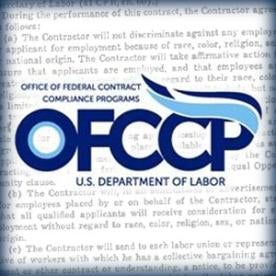The Final Rule on Sex Discrimination from the Office of Federal Contract Compliance Programs recognizes the expanding interpretation of “because of sex” as a basis for discrimination, but does not impose on federal contractors new “equal pay” requirements, a new posting, new subcontract or purchase order updates, or a new tagline on job postings. Instead, the Final Rule updates OFCCP’s 1970’s-era sex discrimination guidelines to reflect changes in attitudes and changes in the law broadly defining “sex” as well as recent interpretations of the OFCCP and the Equal Employment Opportunity Commission. (See, for example, our article, EEOC Stresses Title VII Bars Discrimination against Transgender Workers, Including Regarding Bathroom Access.)
The Rule, published in the Federal Register on June 15, 2016, and going into effect on August 15, 2016, addresses areas where OFCCP believes discrimination remains a “pervasive problem,” such as in sex-based occupational segregation (known as “steering”), wage disparities, discrimination based on pregnancy or family caregiving responsibilities, sex-based stereotyping, and sex harassment. The agency addresses those concerns with recommended “Best Practices,” not specific new legal requirements.
21st Century Update of Definition of Sex
The definition of “because of sex” has evolved dramatically since 1970 (when the OFCCP’s Sex Discrimination Guidelines were first promulgated) beyond fixed ideas of gender based solely on biological characteristics. Bringing federal contractor sex discrimination laws into the 21st century began with the “LGBT” Executive Order 13672 (amending Executive Order 11246) to include “gender identity” and “sexual orientation” as protected statuses. The Final Rule adds “gender identity” as well as “transgender status” and “sex stereotyping” to the definition of “because of sex.”
The Final Rule reflects current case law interpretations of Title VII of the Civil Rights Act. “Sexual orientation” was not included in the Final Rule definition, however, because Title VII case law has not progressed that far.
Restroom Debate That Really Isn’t
The Final Rule addresses the “restroom debate” escalated by North Carolina’s controversial “HB-2” law and decisively resolves the issue for federal contractors. (HB-2 bars local government ordinances protecting LGBT employees and mandates restroom usage based on biological sex.)
The Final Rule makes clear that transgender employees cannot be denied access to the restroom “designated for use by the gender with which they identify.” OFCCP removes any reference to the need for separate or single-user restrooms “to assure privacy between the sexes.” Responding to a comment to the proposed rule, the Final Rule states in its preamble:
This comment assumes that non-transgender employees will react to the presence of transgender employees based on the transgender employee’s birth-assigned gender, rather than on the gender with which they identify in their daily interactions with co-workers. It also assumes that non-transgender employees’ reactions will be based on fear, ignorance, or prejudice about transgender individuals. It is well established that private bias, prejudice, or fear “is not a legitimate basis for retaining the status quo.” Non-transgender co-workers’ fears, ignorance, or prejudice about transgender individuals can no more be permitted to trump the right of transgender employees to equal workplace treatment than white co-worker’s prejudices against sharing restrooms or drinking fountains with black employees would have been permitted to trump black employees’ rights after the Executive Order and title VII went into effect 50 years ago.
Comments to the proposed rule asked OFCCP to prohibit sex-specific, single-user restrooms. While acknowledging such a prohibition might prevent discomfort and harassment, OFCCP declined to prohibit sex-specific, single-user restrooms, but it suggests in Appendix A, “Best Practices,” that designating sex-neutral, single-user restroom is best practice.
Fair Pay, Not Equal Pay
The Final Rule and the accompanying FAQs, Fact Sheet, and other documents from the OFCCP refer to the obligation to provide “fair pay” (the proposed rule referred to the requirement of “equal wages”). “OFCCP agrees the term ‘equal wages’ may create confusion about the legal framework relevant to sex-based compensation discrimination under E.O. 11246,” the Final Rule states.
OFCCP’s Fact Sheet touts that the Final Rule “promotes fair pay practices.” OFCCP acknowledges that similarly situated employees need not be paid equally, but they must be paid fairly based on the gender-neutral, job-related factors (e.g., experience, education, and performance) that distinguish them.
Pregnancy Discrimination, Accommodation
The EEOC and many state legislatures have focused on pregnancy discrimination in recent years. (See, for examples, our articles, EEOC Releases Demanding New Pregnancy Discrimination Guidance, Colorado Expands Pregnancy Discrimination Law, and Nebraska to Require Reasonable Accommodations for Pregnant Workers.) Indeed, EEOC has issued resource documents for pregnant workers (and their doctors) on their legal rights and on how to obtain accommodations in the workplace (including altered break and work schedules, permission to sit or stand, ergonomic office furniture, shift changes, elimination of marginal job functions, and permission to work from home).
Like EEOC’s Guidance published in 2015, the OFCCP’s Final Rule explains that prohibited sex discrimination includes discrimination against pregnant employees because of their pregnancy, childbirth, or related medical conditions (including lactation). The Final Rule’s examples of pregnancy discrimination include:
-
Limiting a pregnant employee’s job duties based solely on the fact that she is pregnant;
-
Requiring a doctor’s note before allowing a pregnant employee to continue working; and
-
Providing employees with health insurance that does not cover hospitalization and other medical costs for pregnancy, childbirth, or related medical conditions to the same extent covered for other medical conditions.
In addition, failing to accommodate a pregnant employee in the same manner that a contractor would accommodate other employees may be discriminatory. Following up on a Supreme Court’s decision and the EEOC’s 2015 Guidance on Pregnancy Discrimination, the Final Rule states that it is unlawful for a contractor to deny an alternative job assignment, modified duty, or other accommodation to a pregnant employee if:
-
The contractor denies such assignments, modifications, or other accommodationsonly to employees affected by pregnancy, childbirth, or related medical conditions;
-
The contractor provides, or is required by policy or other relevant laws to provide, such assignments, modifications, or other accommodations to other employees whose abilities or inabilities to perform their job duties are similarly affected (which most employers would be required to do absent undue hardship under the Americans with Disabilities Act), and the denial of accommodations imposes a significant burden on employees affected by pregnancy, childbirth, or related medical conditions and the contractor’s asserted reasons for denying accommodations to such employees do not justify that burden; or
-
Intent to discriminate on the basis of pregnancy, childbirth, or related medical conditions is shown otherwise.
Additionally, OFCCP reminds contractors that denying an accommodation also may be unlawful if it has a disparate impact on employees affected by pregnancy, childbirth, or related medical conditions.
Disparate Impact
Unlawful discrimination can include policies or practices that have a disparate impact because of sex. The Final Rule provides examples of policies or practices that OFCCP believes may have an unlawful disparate impact based on sex (even if there is no intent to discriminate). Examples include:
-
Denying accommodations to employees affected by pregnancy, childbirth, or related medical conditions (as mentioned above);
-
Height or weight qualifications that are not necessary to the performance of the job and that negatively affect women substantially more than men;
-
Strength, agility, or other physical requirements that exceed the actual requirements necessary to perform the job in question and that negatively affect women substantially more than men;
-
Conditioning entry into an apprenticeship or training program on performance on a written test, interview, or other selection procedure that has an adverse impact on women where the contractor cannot establish the validity of the selection procedure is consistent with the Uniform Guidelines on Employee Selection Procedures;
-
Relying on recruitment or promotion methods, such as “word-of-mouth” recruitment or “tap-on-the-shoulder” promotion, that adversely affect women where the contractor cannot establish that such methods are job-related and consistent with business necessity; and
-
Providing insufficient or no medical or family leave that has an adverse impact on the basis of sex (either sex), unless the particular practice or policy can be shown to be job-related and consistent with business necessity.
Family Caregiver Protections
Anyone can be a caregiver. The OFCCP reminds contractors that unlawful sex-based stereotyping includes adversely treating females based on a sex-based assumption that she has or will have family caregiving responsibilities that will interfere with work or adversely treating a male employee based on a sex-based stereotype that he should not have family caregiving responsibilities and should be available for work without limits.
Equal Access to Benefits
Equal employment opportunity is more than just access to a job. Employees also must have equal access to all of the benefits of the job, including health insurance. The Final Rule mandates that coverage for health care services is made available on the same terms for all individuals for whom services are medically appropriate, regardless of the sex assigned at birth, gender identity, or recorded gender. The denial of coverage for services that affect one gender may constitute a denial of equal access. For example, according to OFCCP, categorical exclusions of coverage for all care related to gender dysphoria or gender transition is facially discriminatory because it singles out for exclusion care for individuals on the basis of gender identity or transgender status. If only a particular service is denied coverage (as opposed to a categorical exclusion), the OFCCP will consider whether there is a legitimate, non-discriminatory reason for the denial that is not a pretext for discrimination.
OFCCP, however, has decided not to step into the contraception battle. In the Final Rule, OFCCP removed language that was in the proposed rule requiring employer-provided health insurance to cover contraception to the same extent that medical costs are covered for other medical conditions. Acknowledging, but sidestepping, this issue, OFCCP points out that both EEOC and the Affordable Care Act already require this and that the courts have taken different views on this requirement.
OFCCP acknowledges that contractors may need to review and update their health plans in light of the Final Rule. It also recognizes that there are limits beyond a contractor’s control that may prevent the contractor from immediately changing its benefit plans. OFCCP states that it will expect to see good faith progress toward making changes in the period immediately following the effective date (August 15, 2016) in circumstances where changing the plan was not yet possible.
Religious Freedom Restoration Act
The Final Rule applies to religious organizations to the extent they are federal contractors or federally assisted construction contractors. However, the OFCCP notes that to the extent any of its provisions affect a religious organization, it permits religious organizations to prefer members of a particular religion and recognizes that the ministerial exception may apply. The OFCCP also states that it will consider requests for exemptions pursuant to the Religious Freedom Restoration Act.
OFCCP’s Suggested Best Practices
The OFCCP suggests “best practices” in the appendix of the Final Rule. Although these practices are not “required,” they provide further insight into what the OFCCP expects and provide the types of steps and attitude that contractors should embrace as a proactive affirmative action employer. Best practices include the following:
-
Avoiding the use of gender-specific job titles such as “foreman” or “lineman” where gender-neutral alternatives are available;
-
Designating single-user restrooms, changing rooms, showers, or similar single-user facilities as sex-neutral;
-
Providing, as part of broader accommodations policies, light duty, modified job duties or assignments, or other reasonable accommodations to employees who are unable to perform some of their job duties because of pregnancy, childbirth, or related medical conditions;
-
Providing appropriate time off and flexible workplace policies for men and women;
-
Encouraging men and women equally to engage in caregiving-related activities;
-
Fostering a climate in which women are not assumed to be more likely to provide family care than men; and
-
Fostering an environment in which all employees feel safe, welcome, and treated fairly, by developing and implementing procedures to ensure that employees are not harassed because of sex.
Takeaways
Contractors should consider the following:
-
Ensuring work environments, policies and practices are inclusive of all individuals regardless of sex, gender identity, transgender status, and pregnancy status.
-
Avoiding sex stereotypes and assumptions about an individual’s willingness to travel, to work late, or other work habits based on an individual’s sex or caregiver status.
-
Avoiding making “paternalistic” assumptions about a pregnant employee or caregiver. Employers are not the caregiver of the employee; although accommodations may need to be made, the employer should not require an employee to take an accommodation or a reduced role because the employer believes it will help the employee, the employee’s unborn child, or the employee’s family member who needs care.
-
Ensuring that leave and other policies provide equal benefits and leave to both men and women.
-
Reviewing accommodation policies to ensure that pregnant employees can take advantage of the opportunities, as appropriate.
-
Reviewing qualification standards and tests that may have a disparate impact on women.
-
Reviewing health care programs to ensure that benefits are offered equally regardless of gender and that there are no categorical exclusions that only affect one gender or that only impact individuals based on gender identity or transgender status.
-
Ensuring the harassment policy is up to date: prohibits harassment based on pregnancy, gender identity, and transgender status and provides multiple avenues for reporting issues.
-
Training employees and managers on anti-harassment and equal employment opportunity.
-
Reviewing compensation policies, practices, and opportunities (training programs, work assignments, and promotions) to ensure that women are not disadvantaged.









 i
i

